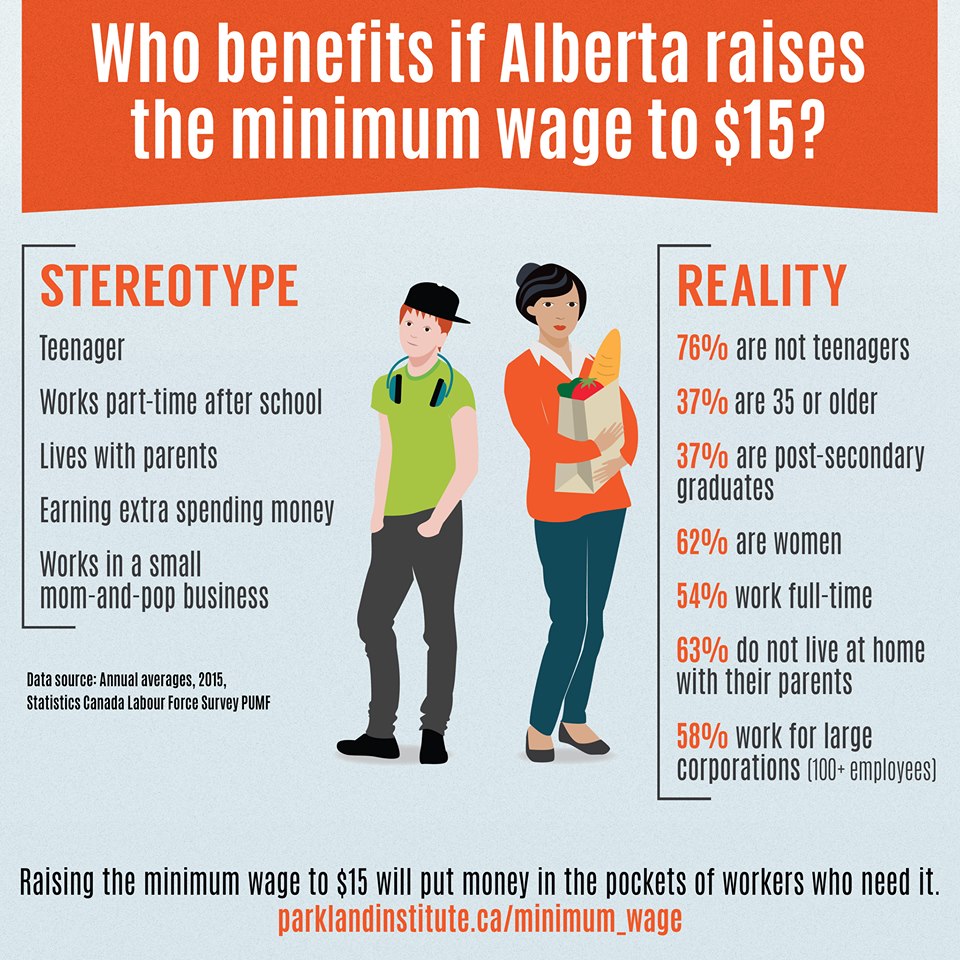In case you missed it, the minimum wage in Alberta has gone up. Actually, for most students, you shouldn’t have missed it, since that’s probably what you’re getting paid right now if you’re working a part-time (or full-time) job to make ends meet while you study. But even if you don’t make minimum wage, this increase has been big news.
As always, I’m no NDP supporter, but some of this opposition to a policy decision has been discussed globally hundreds of times over is getting, frankly, ridiculous. These increases have some very vocal critics – and some of them are going to great lengths to oppose any discussion of minimum wage boosts.
Generally, there are three groups of nay-sayers for minimum wage increases.
The first are those making more than minimum wage. “If they get a raise, so should I!” and “I do way more work than they do and I only get paid [X], they don’t deserve to make [X] too!” are some of the arguments you’ll hear from this camp. This group’s argument also includes the generalization that only teenagers work minimum wage jobs, to earn spending money for video games or whatever “kids are buying these days.”
These are examples of the classic “me, me, me” argument that you’ll find with other classic social situations like NIMBYism (not in my backyard!) and even extreme nationalism (it’s my country, not yours!). These arguments completely remove the focus from the intention of minimum wage increases – to raise those workers up to a level playing field.
The whole discussion over a “livable wage” is very real and, instead of focussing on if these workers can actually afford to live, these naysayers are focussed on how it compares to them; and if they don’t benefit too (see the “I deserve a raise too” argument again) they’re against it. Livable isn’t about ensuring you’re always making 30 per cent more than your neighbour because you think you work harder, it’s supposed to be about being comfortable in the knowledge that both you and your neighbour can afford to eat because you both make a living wage.
Our next group is quite obvious – led by the political opposition in the Wildrose, we have the small government, low regulation, “business always first” crowd. These are the type of people to oppose anything they view as interference in the free market. Business owners in this group will decry wage increases as bad for business, causing sky-rocketing overhead costs and jump starting inflation and job losses as businesses increase prices or cut staff to save their bottom lines.
Well, replace bottom line with profit margin and you’d be right. There are many small businesses who already pay their staff above minimum wage and they seem to be doing just fine. So why the opposition? Certainly there are some industries for which this will be a difficult transition. The restaurant and food service industry is notorious for tight margins – I wouldn’t be surprised to see growing pains here. But with hospitality groups (who own most major nightlife destinations in Edmonton) making buckets of money, it seems the primary opponents of minimum wage increases are big business and unscrupulous profiteers – not your average mom and pop shops.
The last group is one you probably wouldn’t expect. I’ve seen some discussions on social media and elsewhere that appear supportive of minimum wage earners. Except they’re actually opposing minimum wage increases. Their argument? They claim it ends up paying workers less. On the surface, their math looks true. They quote Canada Revenue Agency tax tables and explain their assumptions. The problem is, they are patently false. In my prior career, I was a payroll professional – I learned how to do all the payroll calculations manually. I won’t bore anyone with the calculations but the basis of my argument is that Canada’s income tax system is progressive. This means you will never earn less money after taxes, no matter how many raises you get – unless you lose a ton of tax credits on the way. Let’s face it, a $1 per hour increase on a 40-hour work week adds $2,080 to your annual pre-tax income. You are not jumping tax brackets and certainly not losing out on tax credits. Don’t trust Facebook math on this kind of issue, the real truth will come at tax time.
The truth is that a minimum wage increase is critical to maintain livable wage standards for workers. It means more people have more money to spend, perpetuating our glorious capitalist economy, while relying on fewer government subsidies or supports. It won’t destroy the economy, prices will only go up in some businesses (in which case, I suggest vote with your wallet and support businesses that are already paying their staff a decent wage), and if you’re unhappy that you’re suddenly making minimum wage, perhaps it’s time to talk to your boss, because we all deserve a living wage.
– Nicolas Brown, Issues Editor





